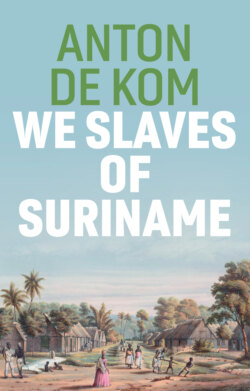Читать книгу We Slaves of Suriname - Anton de Kom - Страница 14
A Vision of Motherly Listening
ОглавлениеHere, in closing, is another key passage from the final chapter of We Slaves. In it, De Kom lays out his literary vision, in much the same way as Du Bois in The Souls of Black Folk. While Du Bois sees the sorrow songs and African-American music as the instruments of positive change in American culture, De Kom describes his vision through the story of his arrival in Suriname, where he is hailed as a savior. At that stage, he doesn’t quite know what to do; he is under surveillance by investigators and forbidden to give speeches.
It’s as though someone has suddenly knocked at my heart: What will you do to ease your people’s suffering? In the velvet darkness of the night I hear soft steps.
Mother, what can I do to help? My comrades are waiting. I have only just returned. So much has changed.
It seems as if my mother leans in to kiss me, the way she did when I was little, the way she listened to my complaints and my sorrow ebbed away because someone was willing to listen.
And all at once I know: I will open an advisory agency and listen to the complaints of my fellows, the same way my mother once listened to her son’s sorrows. (p. 202)
De Kom had traveled to Suriname with his wife and children to see and speak to his mother, but she died not long before his arrival. It is as if that personal trauma of arriving too late is transformed into this image, this vision of motherly listening as the driving force of change. Not the archetypal male response of fighting back, as Frederick Douglass fought the “Negro-breaker” Covey, but listening and working with others: that is the vision that comes to De Kom in We Slaves.
It is striking that this key passage has gone almost unnoticed in discussions and interpretations of We Slaves, with the emphasis placed instead on the autobiographical person and on communist allegations about a kind of revolution. In We Slaves, this revolutionary vision is explicitly rejected. Ndyukas, members of a maroon people, want to conceal weapons on the grounds of De Kom’s house. But De Kom writes:
Almost every day, representatives of the Ndyukas of Boven-Commewijne came to me, and I received a number of offers to bring weapons to my property in secret, offers I rejected in the most forceful terms. What I was after was organization, not a bloodbath. (p. 208)
Instead of promoting violent resistance, De Kom tries to achieve change through a strategy of listening. His mother listened to his complaints, and that helped “because someone was willing to listen.” De Kom listens to the complaints of “his fellows,” and today’s reader listens to De Kom.
In Suriname, De Kom was taken prisoner and confined to Fort Zeelandia. Here too, there is a parallel to many African-American writers such as Douglass, Jacobs, and Malcolm X, who all spent time in American prisons in the course of their lives and wrote about their experiences.
I hope it is clear by now that De Kom’s experiences, his journey toward self-knowledge and self-confidence, and his writing stand in a literary context and tradition. One significant contrast with the African-American context, however, is that many North American college students are assigned Frederick Douglass or W.E.B. Du Bois as required reading in a survey of American literature. My son, who is studying at an American university, recently asked me if I would read his essay about Douglass. African-American works have entered the canon of American literature, and there are now essays comparing “Call me Ishmael” (the famous opening sentence of Herman Melville’s Moby-Dick) to “I was born a slave.” Like Melville, Douglass is now seen as an American cultural icon.
The same cannot yet be said of De Kom in the Netherlands. I read Simon Vestdijk’s Back to Ina Damman (1934) in secondary school in the Netherlands many years ago, as a text exemplifying Dutch literature and culture of the 1930s. Perhaps now, students will read We Slaves alongside the canonical Vestdijk, analyze these texts together, and establish a different, inclusive Dutch literary canon of the early twentieth century. Maybe then a new Dutch literary “We” of interconnection will emerge, a “We” of listening and sharing.
